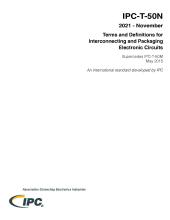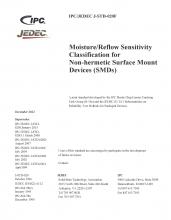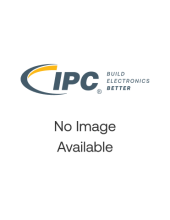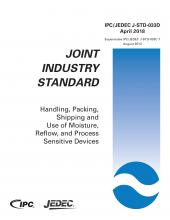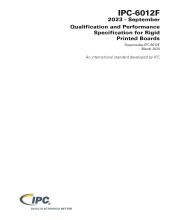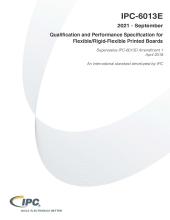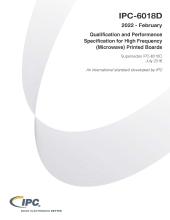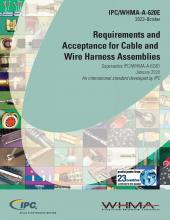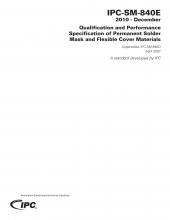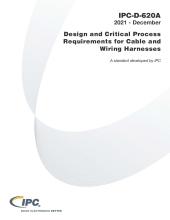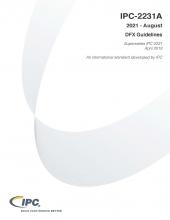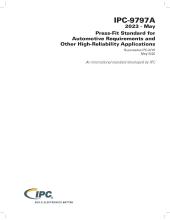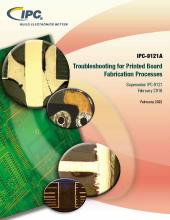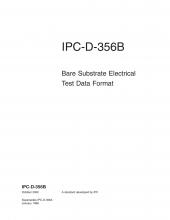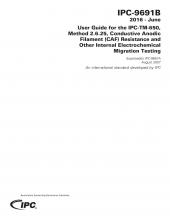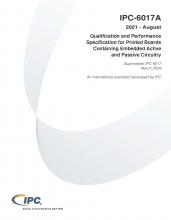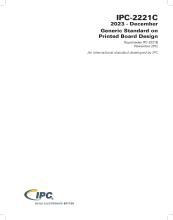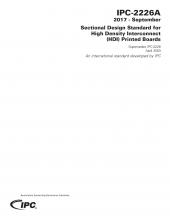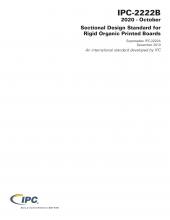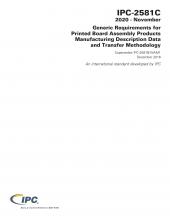Products
IPC-T-50N document is designed to provide definitions for terms commonly used in the electronics industry. The definitions are intended to provide sufficient clarity of detail such that a reader utilizing English as a second language could understand the subtleties of the meaning. IPC-T-50N contains over 550 new or revised terms, including new terminology for via structures, surface mount device...
IPC/JEDEC J-STD-020F standard is to identify the classification level of nonhermetic SMDs designed for surface mount assembly that are sensitive to moisture-induced stress so that they can be properly packaged, stored, and handled to avoid damage during assembly solder reflow attachment and/or repair operations. IPC/JEDEC J-STD-020F standard may be used to determine what classification level...
IPC-2223E used in conjunction with IPC-2221, IPC-2223 establishes the specific requirements for the design of flexible printed boards and forms of component mounting and interconnecting structures. The flexible materials used in the structures are comprised of insulating films, reinforced and/or non-reinforced dielectric in combination with metallic materials. IPC-2223E provides new design...
IPC/JEDEC J-STD-033D provides surface mount device manufacturers and users with standardized methods for handling, packing, shipping and use of moisture/reflow sensitive components. These methods help avoid damage from moisture absorption and exposure to solder reflow temperatures that can result in yield and reliability degradation and damaged components. IPC/JEDEC J-STD-033D procedures provide a...
IPC-6012F, covers qualification and performance of rigid printed boards, including single-sided, double-sided, with or without plated-through holes, multilayer with or without blind/buried vias and metal core boards. It addresses final finish and surface plating coating requirements, conductors, holes/vias, frequency of acceptance testing and quality conformance as well as electrical, mechanical...
IPC-6013E standard covers qualification and performance requirements for flexible printed boards designed to IPC-2221 and IPC-2223. The flexible printed board may be single-sided, double-sided, multilayer or rigid-flex multilayer. All of these constructions may include stiffeners, PTHs, microvias, and blind/buried vias. The IPC-6013E standard incorporates new and updated requirements for final...
The IPC-6018D standard covers qualification and performance of high frequency (microwave) boards, including single-sided, double-sided, with or without plated-through holes, multilayer with or without blind/buried vias and metal core boards. It addresses final finish and surface plating coating requirements, conductors, holes/vias, frequency of acceptance testing and quality conformance as well as...
IPC/WHMA-A-620E is the only industry-consensus standard for Requirements and Acceptance of Cable and Wire Harness Assemblies. IPC/WHMA-A-620E describes materials, methods, tests and acceptance criteria for producing crimped, mechanically secured and soldered interconnections and the related assembly activities associated with cable and harness assemblies. IPC/WHMA-A-620E was developed by IPC and...
Establishes the requirements for the evaluation of liquid and dry film solder mask material and for the determination of the acceptability of use on a standard printed board system. IPC-SM-840 provides two classes of requirements, T and H, to reflect functional performance requirements and testing severity based on industry/end use requirements. Coverage is given to adhesion, material qualification...
IPC-1791D standard provides minimum requirements, policies and procedures for printed board design, fabrication, assembly, and cable and wire harness assembly organizations and/or companies to become trusted sources for markets requiring high levels of confidence in the integrity of delivered products. These trusted sources shall ensure quality, supply chain risk management (SCRM), security and...
This document bears two reference numbers, and may be obtained from IPC or the IEC. IPC-D-350D and IEC 1182-1 are identical in technical content. The IEC version of this document also contains a French translation. The IEC is responsible for the accuracy of that translation.Specifies record formats used to describe printed board products with detail sufficient for tooling, manufacturing and...
The IPC-D-620A standard provides design and critical process requirements for cable and wire harness assemblies as well as military/space applications. IPC-D-620A is the design requirements companion to IPC/WHMA-A-620, "Requirements and Acceptance for Cable and Wire Harness Assemblies," and its associated Space Addendum. Three white papers are included to provide guidance on key topics discussed...
IPC-2231A provides guidelines for establishing a best practice methodology for use in developing a formal DFX (Design for Manufacturing, Fabrication, Assembly, Testability, Cost, Reliability, Environment, Reuse) process for layout of printed boards.
Controlled impedance is the maintenance of some specified tolerance in the characteristic impedance of an interconnect line (transmission line) that is used to connect different devices on a circuit. Controlled impedance is often a design consideration for high-speed digital or high-frequency analog circuits. This guide is intended to be used by circuit designers, packaging engineers, printed...
IPC-9797A is the only industry-consensus standard for Requirements and Acceptance of Press-fit Pins. IPC-9797 describes materials, methods, tests and acceptance criteria for solderless press-fit pin connections. IPC-9797 is supported by IPC-HDBK-9798 “Handbook for Press-fit Standard for Automotive Requirements and other High-Reliability Applications” for those wanting additional information and...
The IPC-1921A handbook provides problems, causes and possible corrective actions related to printed board manufacturing processes. Includes more than 200 photos and illustrations depicting common defects.
IPC-1782B establishes minimum requirements for manufacturing and supply chain traceability based on perceived risk. IPC-1782B applies to all products, processes, assemblies, parts, components, equipment used and other items as defined by users and suppliers in the manufacture of printed board assemblies, as well as mechanical assembly and printed board fabrication. IPC-1782B is applicable both for...
UPDATED! This standard describes a data format for transmitting bare board electrical test information in digital form, including data suitable for computer-aided repair. When used as a netlist input to test data processing, the receiver of IPC-D-356B data will determine test point assignments and positioning. Enhancements to the B Revision include updates to the concept of testable areas to...
This document is the product of the IPC Electrochemical Migration (ECM) Task Group. It was drafted to provide guidance regarding implementation of the User Guide for the IPC-TM-650, Method 2.6.25, Conductive Anodic Filament (CAF) Resistance and Other Internal Electrochemical Migration Testing to evaluate the effects of mechanical stress, laminate material fracturing, ionic contamination, moisture...
While there are a variety of industry test vehicles for the examination of material compatibility, the IPC-B-52 test board was created to meet the needs for testing both ion chromatograph and surface insulation resistance (SIR) which would be more representative of the manufacturing materials and processes. IPC-9203A standard addresses the IPC-B-52 test vehicle, which can be used to evaluate a...
The IPC-6017A standard defines the electrical, mechanical, and environmental requirements specific to embedded passive and active circuitry in printed boards. These requirements are in addition to the applicable requirements of other performance specification(s) (e.g., J-STD-001).
IPC-2221C is the foundation design standard for all documents in the IPC-2220 series. It establishes the generic requirements for the design of printed boards and other forms of component mounting or interconnecting structures, whether single-sided, double-sided or multilayer. Among the many updates to Revision C are new guidance and requirements on material and copper foil selection...
IPC-2226A, Sectional Design Standards for High Density Interconnect (HDI) Printed Boards is used in conjunction with IPC-2221B. The IPC-2226A standard establishes requirements and considerations for the design of high density interconnect (HDI) printed boards and microvia technology. Revision A constitutes a substantial update to the document, with an all new color key for HDI constructions, new...
IPC-2222B used in conjunction with IPC-2221, establishes the specific requirements for the design of rigid organic printed boards and other forms of component mounting and interconnecting structures. The IPC-2222B standard applies to single-sided, double-sided, or multi-layered boards. Key concepts in IPC-2222B are rigid laminate properties, design requirements for printed board assembly and...
The IPC-2581C standard specifies the XML schema that represents the intelligent data file format used to describe printed board and printed board assembly products with details sufficient for tooling, manufacturing, assembly, and inspection requirements. This format may be used for transmitting information between a printed board designer and a manufacturing or assembly facility. The data is most...
Coming Soon
IPC-7095E: Design and Assembly Process Implementation for Ball Grid Arrays (BGAs)
IPC-2294: Design Standard for Printed Electronics on Rigid Substrates
IPC-6904: Qualification and Performance Specifications for Printed Electronics on Rigid Substrates
J-STD-005B: Requirements for Soldering Pastes
IPC-4105: Specification for Metal Base Copper Clad laminates for Rigid Printed Boards
J-STD-004D: Requirements for Soldering Fluxes
IPC-4413: Specification for Finished Fabric Woven from Low Dk Glass for Printed Boards

